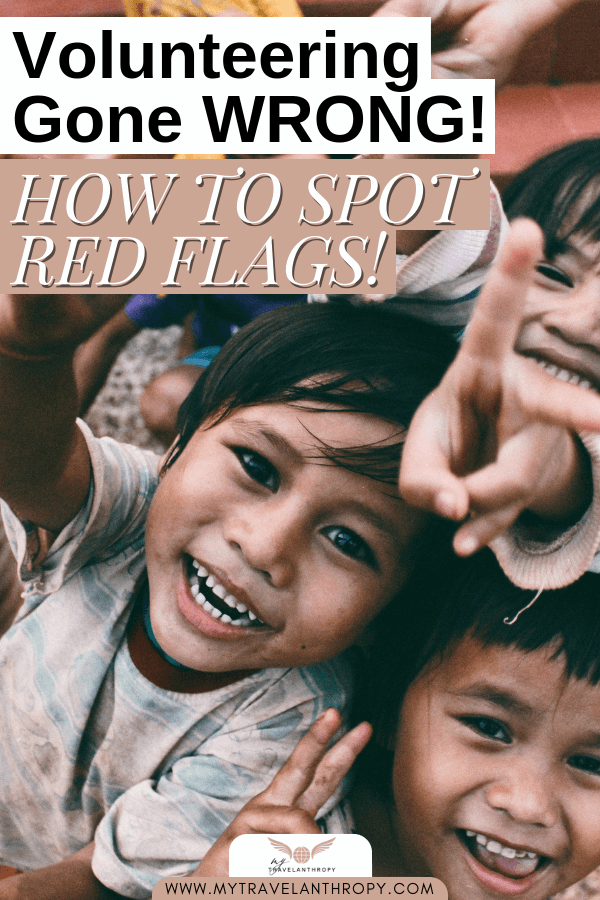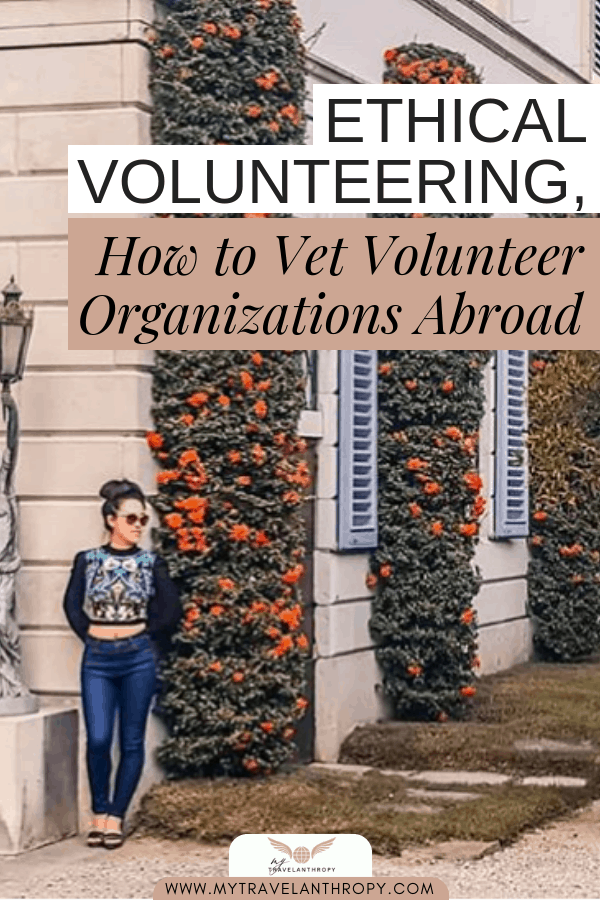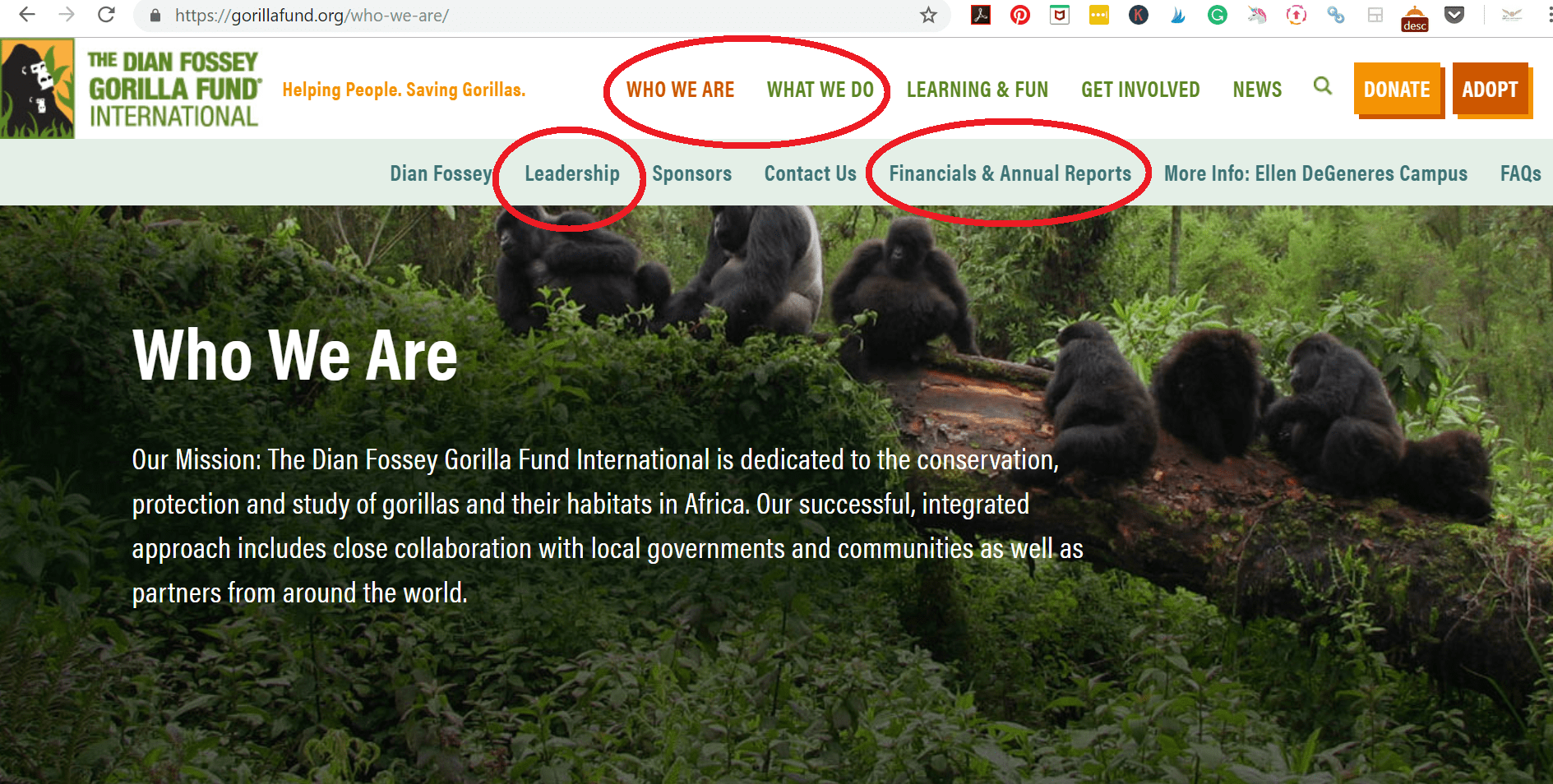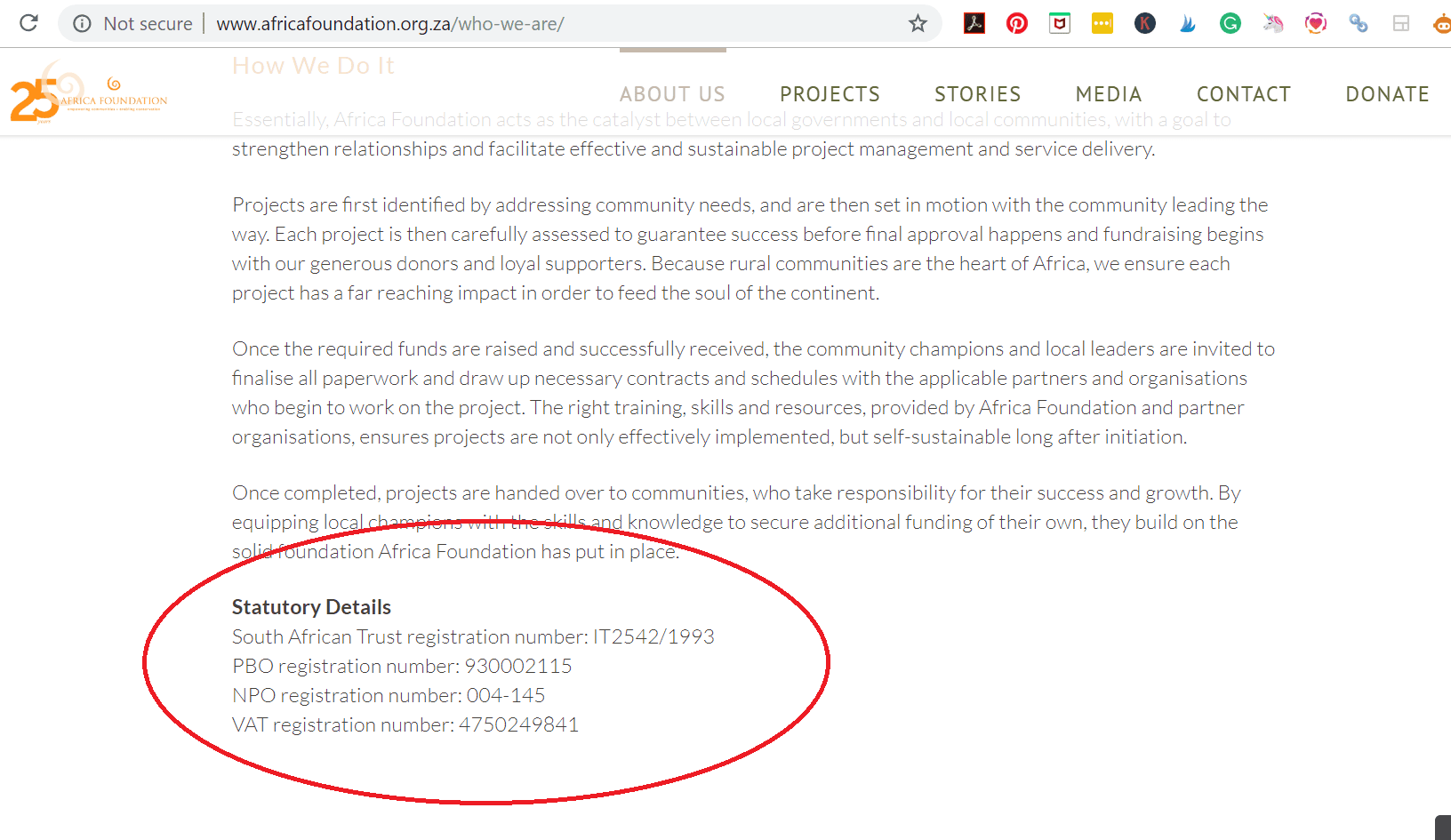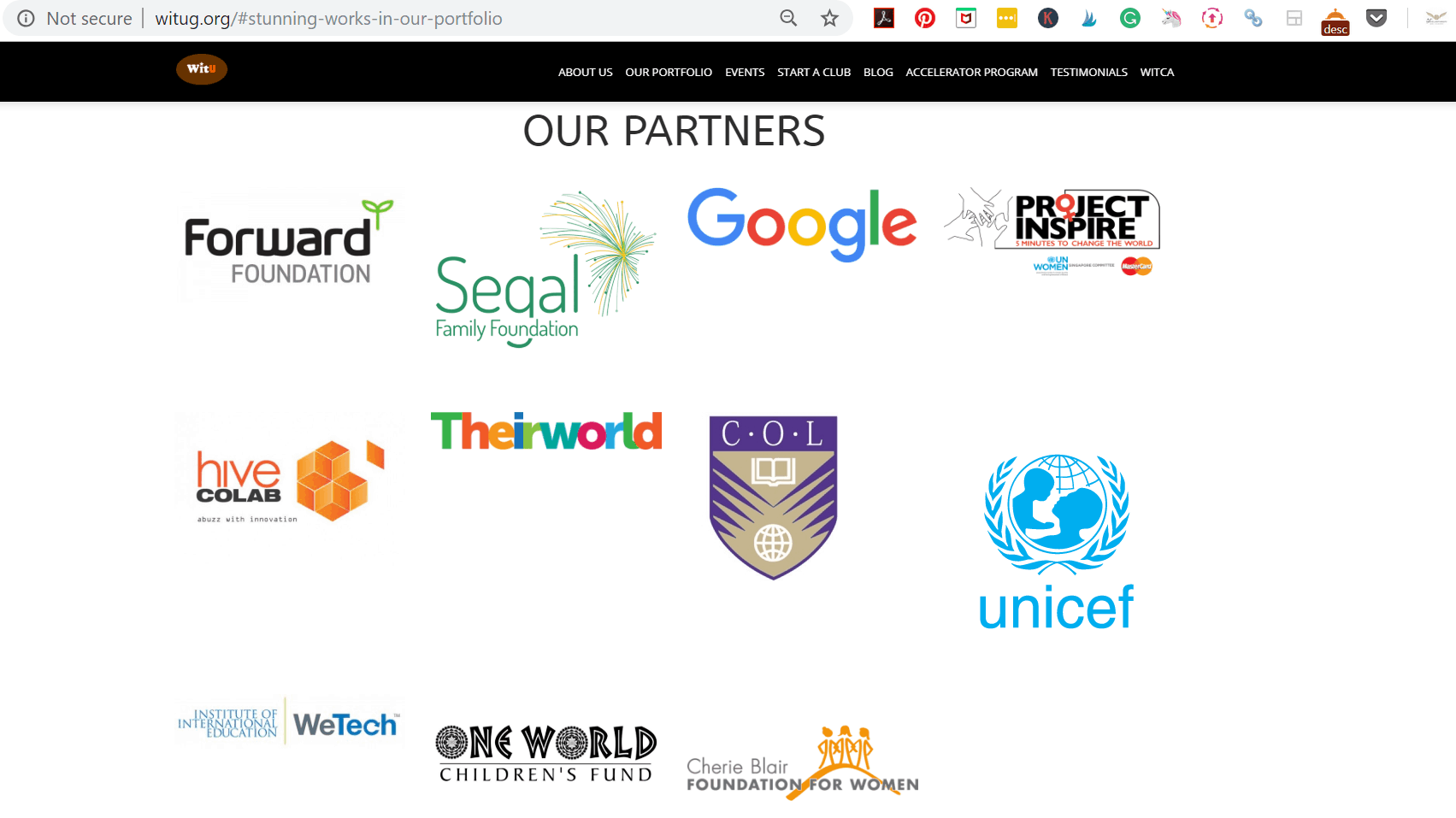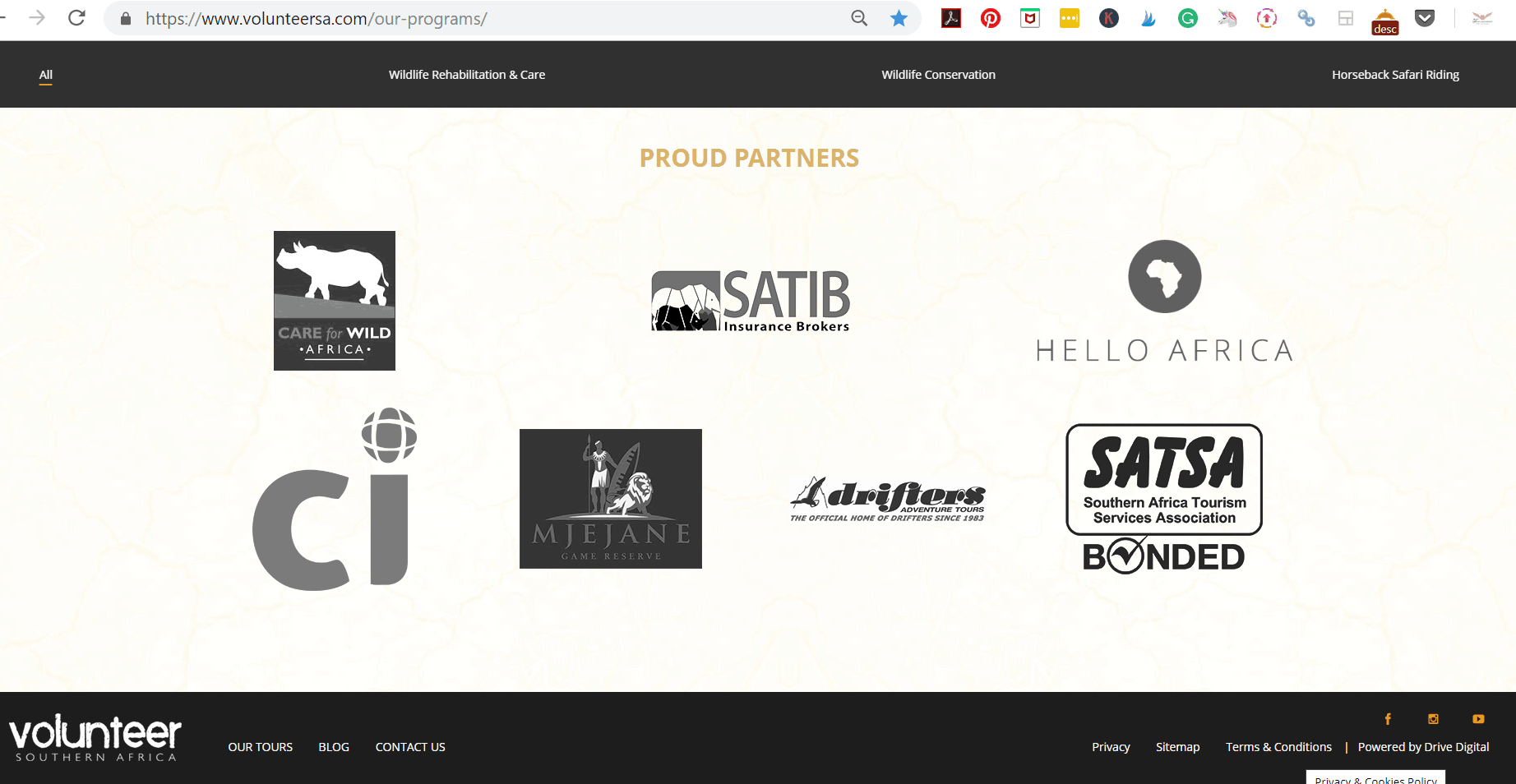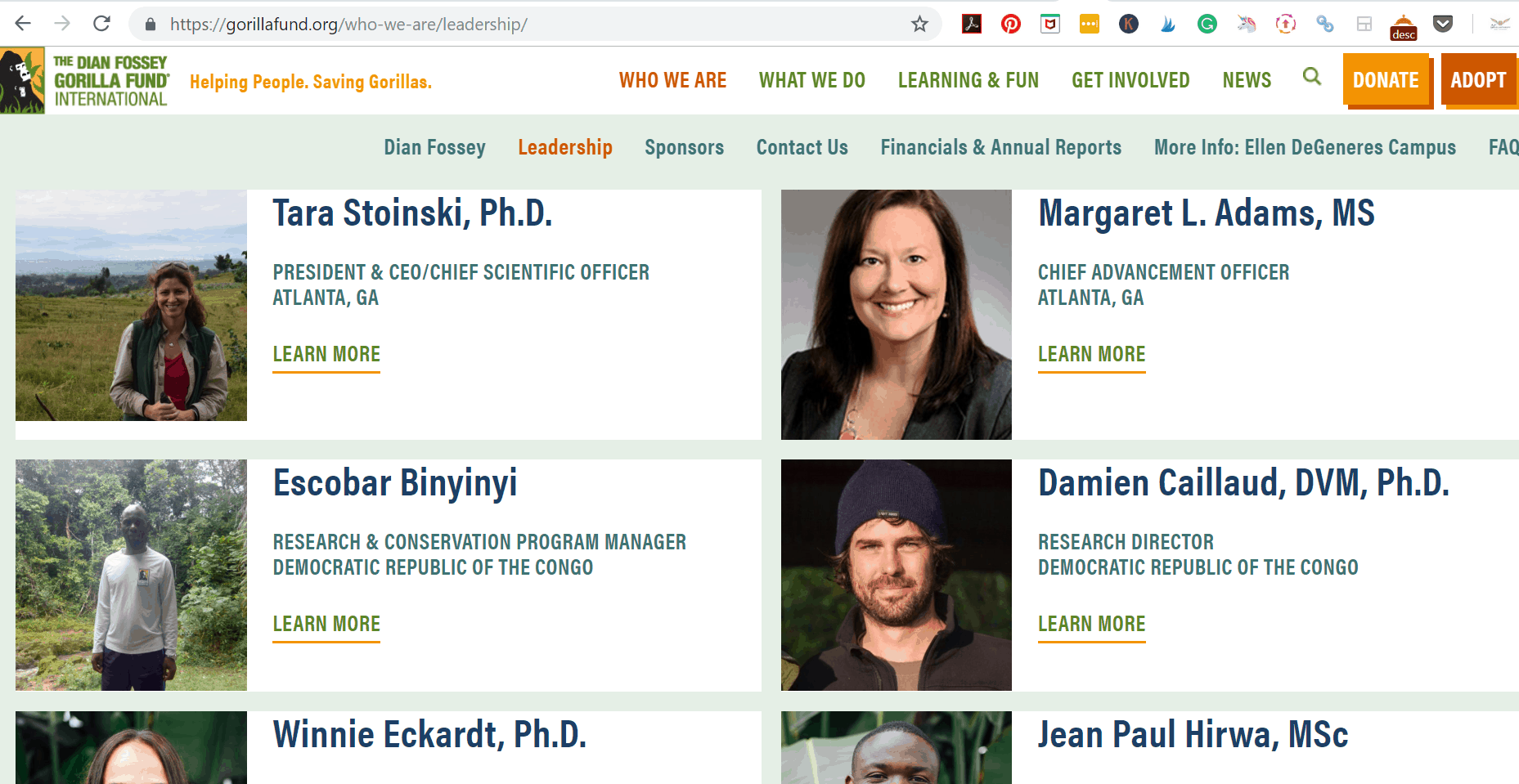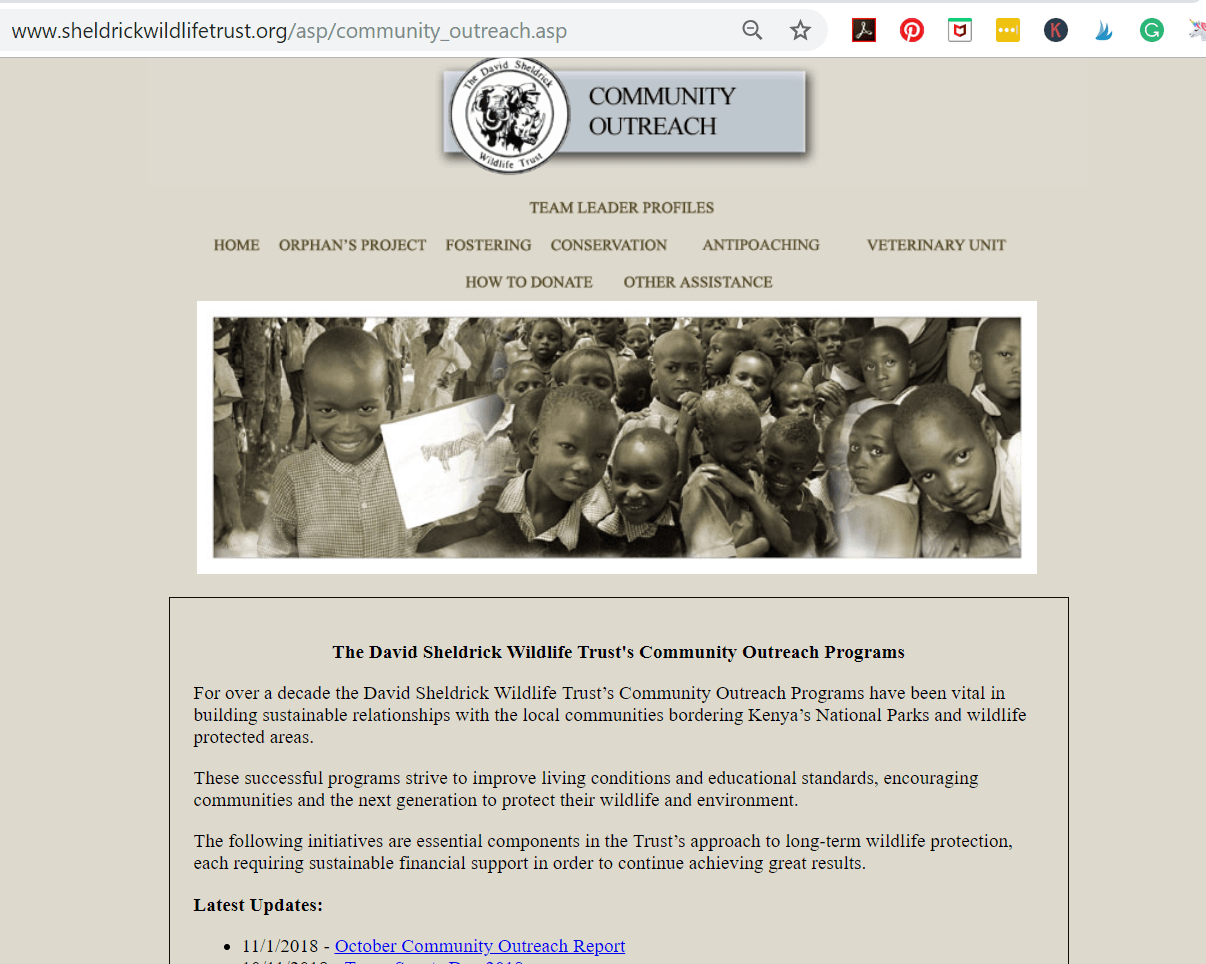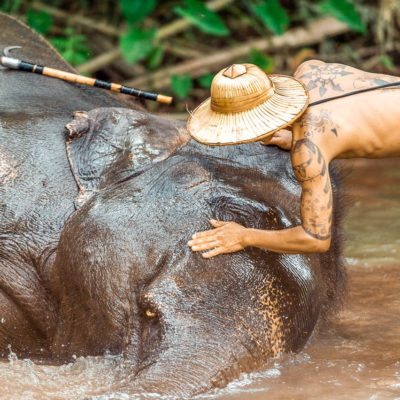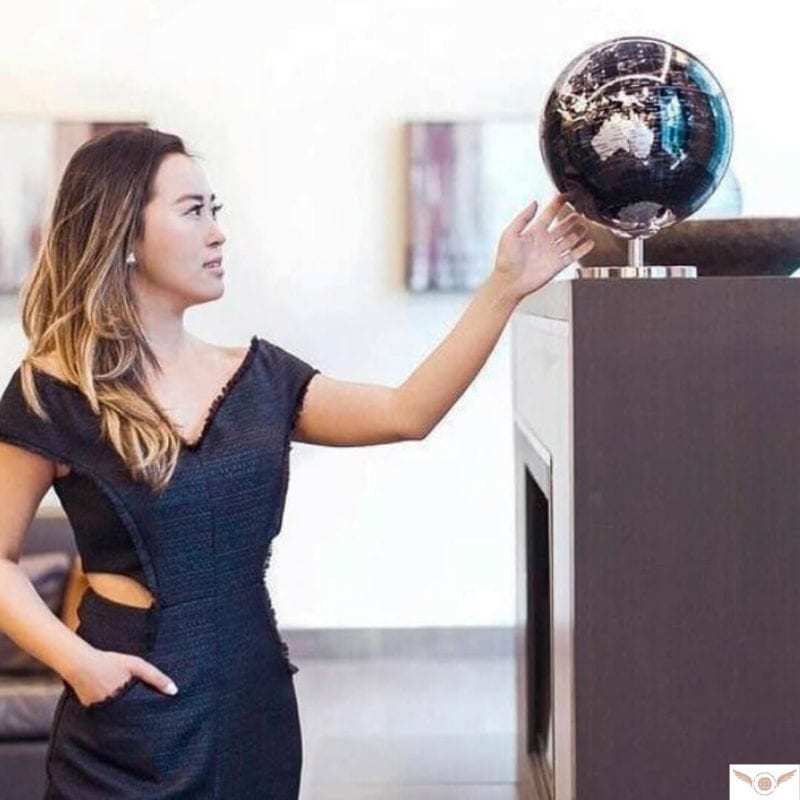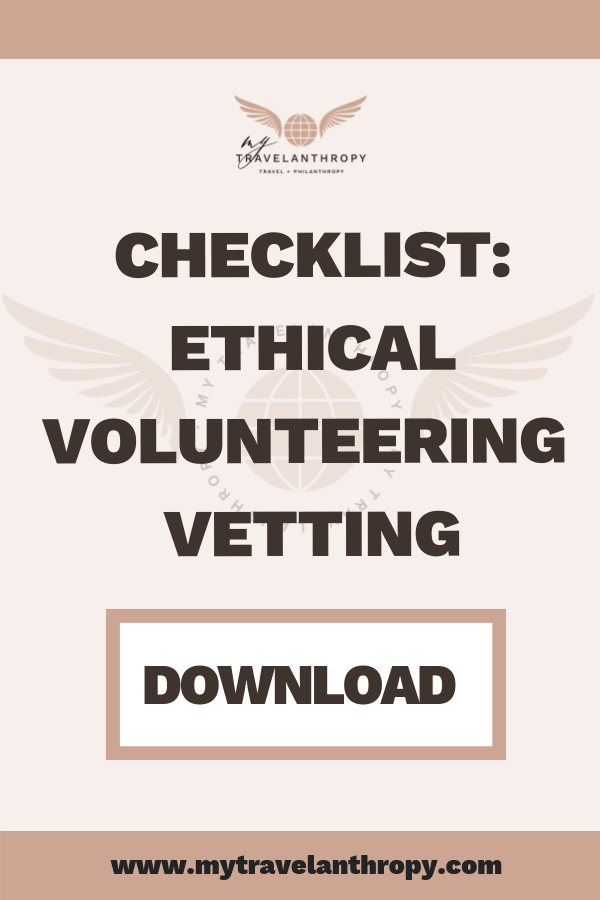If you’re considering volunteering abroad, how do you identify and vet volunteering organizations to ensure that they are operating ethically, genuine about their cause and not just looking to sell you a “feel good” experience to make a profit? With the overwhelming information on the internet about volunteer organizations abroad, how do you know which ones are legitimate?
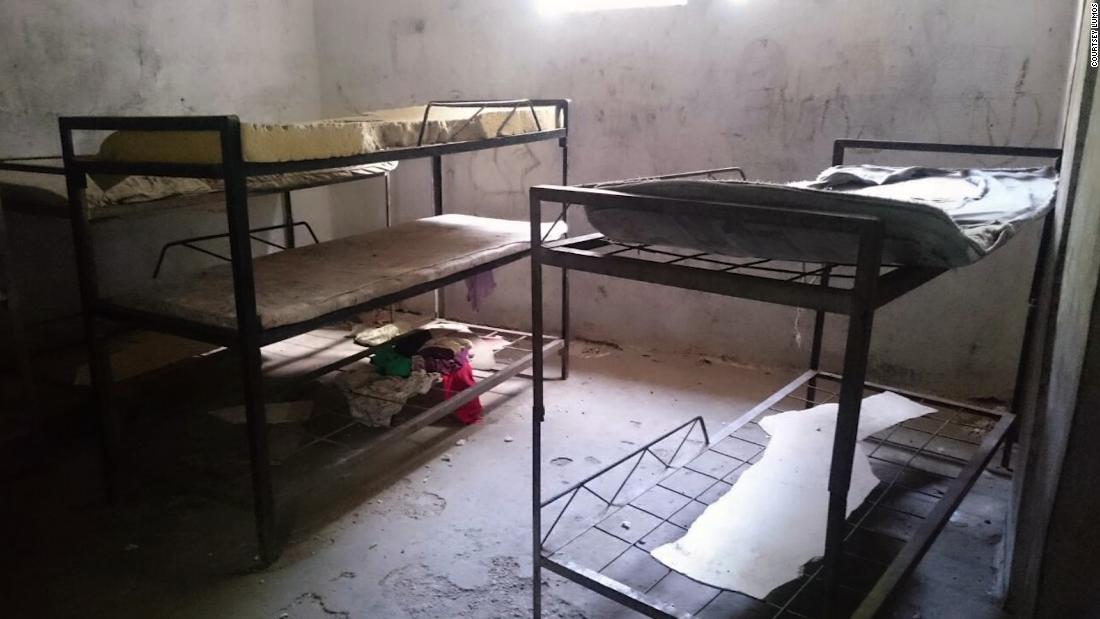
Photo Credit: CNN
Here are some things to watch out for when vetting a volunteer organization abroad to avoid getting scammed!
1. Does the volunteer organization have a website? Do they provide transparent information about who they are, what they do, their mission and goals, etc? Is there a bio of the staff and/or board members?
Is the website filled with a carousel of local tourist spots and constantly trying to “sell” you an experience, or is it filled with a thorough explanation of their project values? You’re off to a good start if the website is less concerned with being aesthetically pleasing and more focused on transparency regarding its leadership, mission and goals, annual reports, and information on what donations are funding. You should also look for where the organization is located, when the organization was established, as well as solid bios of staff members (it is important to look for staff that has been working for the organization on a full-time basis, a high turnover could indicate that the organization uses volunteers from abroad to fill in local jobs).
Below is an example of an ethical organization, The Dian Fossey Gorilla Fund International, which has transparent information about their financing, what they do, who they are, and who works there.
2. Is the volunteer or charity organization registered?
You can often find whether an organization is officially registered by looking at the bottom of their website, usually in the “about us” section indicated by a series of numbers and/or letters. Some countries have websites that track non-profit organizations that are officially registered with the government and meet certain requirements. Sometimes, if the charity or volunteer organization is affiliated with the local tourism board, I like to do a little digging myself and email them to verify their claims. See below a sample of Africa Foundation (in South Africa):
3. How long has the volunteer organization been around and is the organization affiliated with other credible international organizations and/or sponsors?
To find credible international volunteer opportunities (especially if this is your first time), I recommend you go through an internationally-recognized, credible organization in your own country that is affiliated with organizations in countries you may want to volunteer.
Also, look for organizations that are affiliated with well-known companies or sponsors. For example, Global Volunteers which facilitates many projects ranging from computer literacy to nutrition education was granted consultative status by the United Nations (consultative status is the highest status granted by the United Nations to non-governmental organizations (NGO’s), thereby allowing them to participate in the work of the United Nations). Similarly, Plan My Gap Year which focuses primarily on humanitarian projects in Africa and Asia, has received numerous awards, including the Thailand Green Excellence Award and the Shell LiveWire Grand Idea Award. If an organization is legitimate, there should be some proof of its impact, either by its third-party recognition and accolades or its major affiliations.

4. Does the organization have full-time staff? How many volunteers do they usually place and what are their roles and responsibilities of volunteers and how does it differ from full-time staff?
Make sure that the organization doesn’t just hire volunteers to replace jobs for the local community in which they are serving. If an organization does not have any long-term or permanent staff, it could be a red flag to indicate that they are rotating volunteers for free labour as opposed to hiring someone within their community to fill in the positions.
Below is an example of the Dian Fossey Gorilla Fund International organization integrating and working together with local community members that they are serving. Organizations should always be working with local communities.
5. Does the organization offer skill-based volunteer positions that require experience and specific certifications? Ex. If you want to volunteer at a medical facility, is there a requirement that you need a medical certificate or training in order to apply?
A volunteer organization needs to vet and recruit volunteers who have many years of experience and/or the proper certifications, references and criminal background checks, for specific roles (especially as a role of a caregiver to children). And if they do not have some sort of requirement in place to vet volunteers, stay away from the organization, you could be doing more harm than good by volunteering.
“A mismatch between skill and responsibility levels can risk causing significant harm…Often the volunteer placement organization is responsible for the mismatch. A large number of organizations advertise qualifications or experience, often for roles such as teach or project management, which are specialist skills that are in the volunteers’ home countries require formal training. Volunteers who know nothing about construction can build poor-quality, even dangerous, structures; volunteers who lack business experience can give damaging advice to local entrepreneurs; volunteers without teaching skills can disrupt students’ learning…Many volunteer placements are designed in a way that gives volunteers a level or authority or autonomy beyond their qualifications.” (Learning Service The Essential Guide to Volunteering Abroad, Bennett, Collins, Heckscher, Papi-Thornton).
Below is an example of a volunteer post which requires specific skills and experience in order to apply:
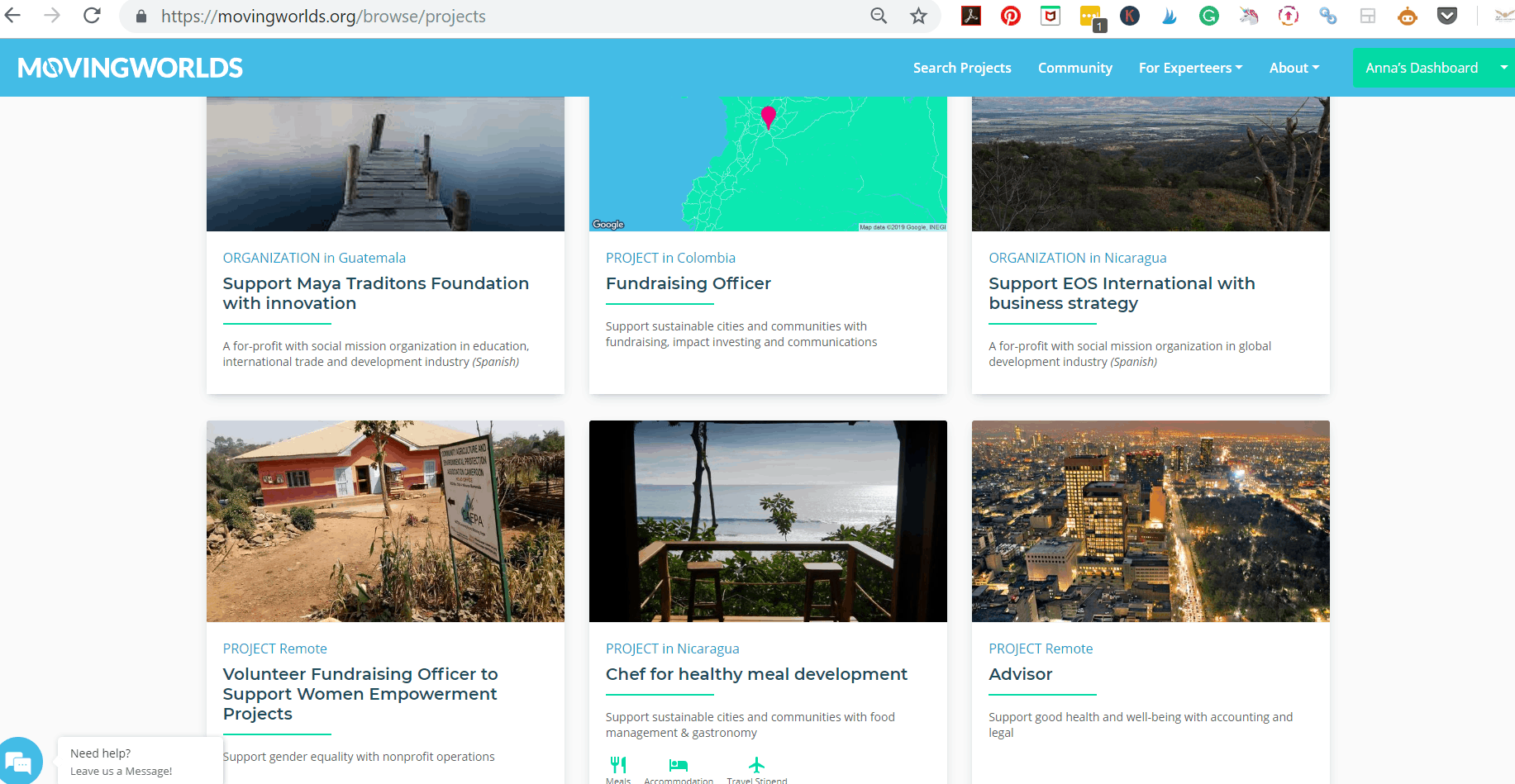
Photo: MovingWorlds
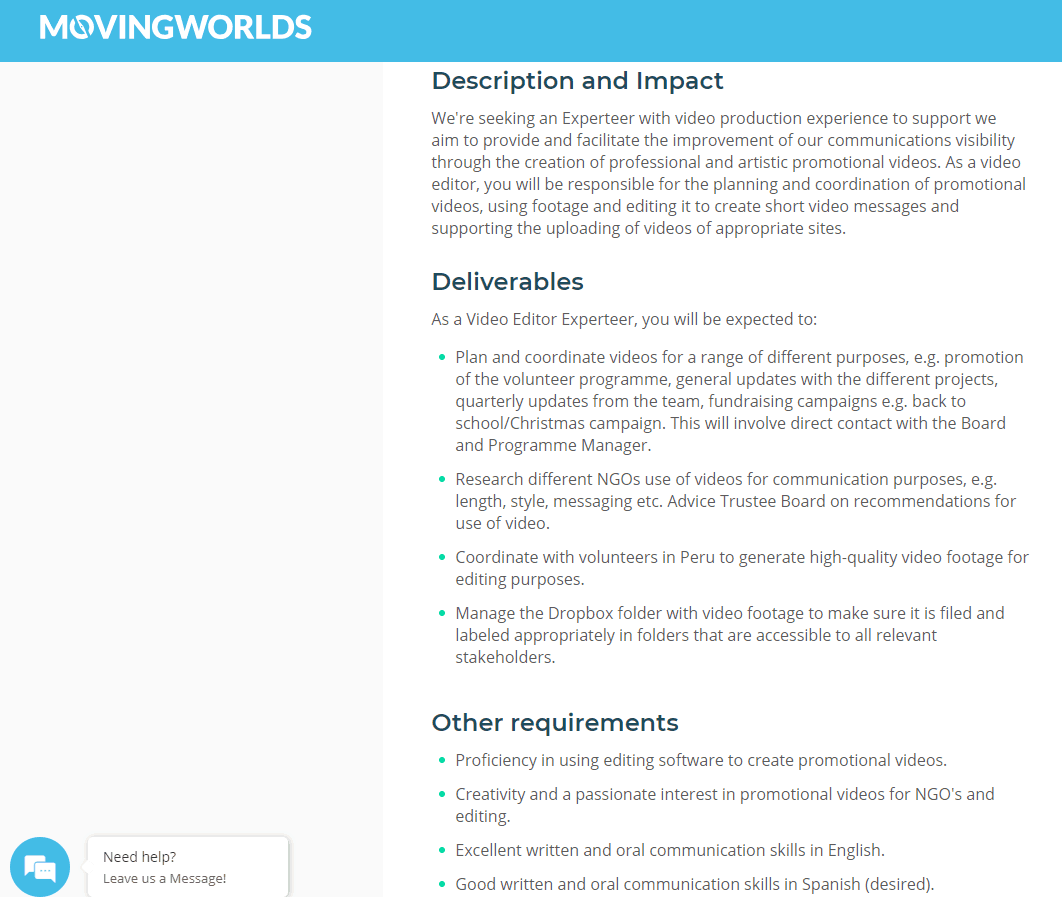
Photo: Skilled-based Volunteering Video Editor Position for a volunteer organization, MovingWorlds
6. Are the volunteer positions being offered help the local communities? Is the organization working with the local community to help achieve their long-term goals (as opposed to taking jobs away from the locals by hiring volunteers abroad)?
Volunteer organizations should always be working in partnership with the local community to get them involved in reaching their long-term goals. Emphasis is on working in unison with the local community, as opposed to isolating them and taking away from the community.
See below an example of the Sheldrick Wildlife Trust organization’s statement on working together with the local community in reaching long-term goals -“David Sheldrick Wildlife Trust’s Community Outreach programs have been vital in building sustainable relationships with the local communities bordering Kenya’s National Parks and wildlife protected areas. These successful programs strive to improve living conditions and educational standards, encouraging communities and the next generation to protect their wildlife and environment.”
7. Is there a volunteer vetting process and any training provided if you do get accepted into the program?
You should always do your own research before volunteering abroad, however, a well-managed volunteer organization should at least give you a welcome package which includes information on the country, culture, costs, transportation, what to expect, emergency contacts, visa information etc. Some provide online training and/or connect you with the local staff if you have any further questions. They should at least have some sort of an information/training package prepared for you prior to departure and when you arrive.
8. What are the fees associated with the program? Are the fees transparent? Do you know what you are paying for?
Don’t be afraid to dig deeper. If an organization gives you vague answers (i.e. your placement fee goes toward “project development”), ask for specifics. If they can’t give you solid, detailed answers, that could be a sign that the funds aren’t being used ethically.
9. Are you able to connect with past volunteers to ask questions about their experiences? The volunteer organization should be able to connect you with a few volunteers that have previously volunteered at one of their programs. Ask them to send you at least 2 or 3 so you can ask all the necessary questions you have so you have an idea of what to expect. Even though a volunteer may have had a great experience, there is always room for improvements, don’t be afraid to ask what they are! On the side of caution, I have read in some instances where some volunteer organizations hire people or offer them an incentive to write positive reviews. If all reviews are positive and don’t mention anything negative at all, this could be one of the reasons as to why.

10. Does the organization involve working with orphans and/or any vulnerable children?
This can be harmful in many ways, especially with the rise of children orphanages being used as a human trafficking business. Having inexperienced volunteers on a short-term basis can have a severe impact on children as they are vulnerable and can suffer from long-term damage from bonding with unqualified and temporary volunteers, which can lead to attachment disorders and insecurity issues. Unqualified volunteers can place children in dangerous situations, sometimes without even being aware of it. “One of the most popular forms of volunteer travel involve working with children, usually as a caregiver. The high demand for child-based volunteering has led to a number of serious problems, all with the same genesis: volunteer-sending organizations are reluctant to highlight risks because people are willing to pay…” (Learning Service The Essential Guide to Volunteering Abroad, Bennett, Collins, Heckscher, Papi-Thornton).
11. Is this organization genuinely trying to make an impact or just trying to sell you a “feel good” experience? Follow and trust your instincts.
Additionally, it’s important to really dig deeper and be knowledgeable of all the details. Ensure that your placement is truly a volunteer role and not just a fill-in for local labour. Think about the impact of your work and how long it will last. The work you do should be locally driven, sustainable, and purposeful.
Also, look into the qualifications for volunteers. Are the volunteers being vetted properly? Everyone who volunteers abroad should meet requirements and possess applicable skills. There should be a selection process and a full individual work description available. Do they provide training? Hope and enthusiasm, while appreciated, are not enough to make a difference abroad.
12. Check local community news media outlets online and read postings on forums.
If you want to go a little deeper in your research, Google local community news media outlets online, read through postings on Reddit forums and do a keyword search on your organization and country of your desired destination. If there are any stories of scandals of any sort, you are likely to find in the community newspapers.
If you’re still not sure, don’t be afraid to schedule a call to ask more questions. A volunteer organization that is operating legitimately will always be transparent in answering your questions. Don’t be afraid to dig deeper to vet the volunteer organization!

*PIN- IT! If you like this post and want to keep it for future reference, don’t forget to pin the image/s below on Pinterest!
